UK Politics: From Government to Governance and English Nationalism
VerifiedAdded on 2023/06/09
|10
|3467
|211
Essay
AI Summary
This essay examines the rise of English nationalism in the 21st century, tracing its roots to historical factors, including the desire for self-governance and the impact of immigration and Euroscepticism. It discusses how the devolution of the UK and the decision to leave the European Union (Brexit) have fueled nationalistic sentiments. The essay also highlights the role of right-wing political groups, such as the English Defence League (EDL) and the British National Party (BNP), in promoting Englishness and their impact on immigration policies and social cohesion. It further explores the social and economic factors contributing to nationalism, including class divisions and the perception of threats to cultural homogeneity, ultimately arguing that the current form of English nationalism is a complex phenomenon shaped by political, cultural, and economic forces, with potentially negative consequences such as racism and political instability. Desklib offers a wide range of academic resources and study tools for students.
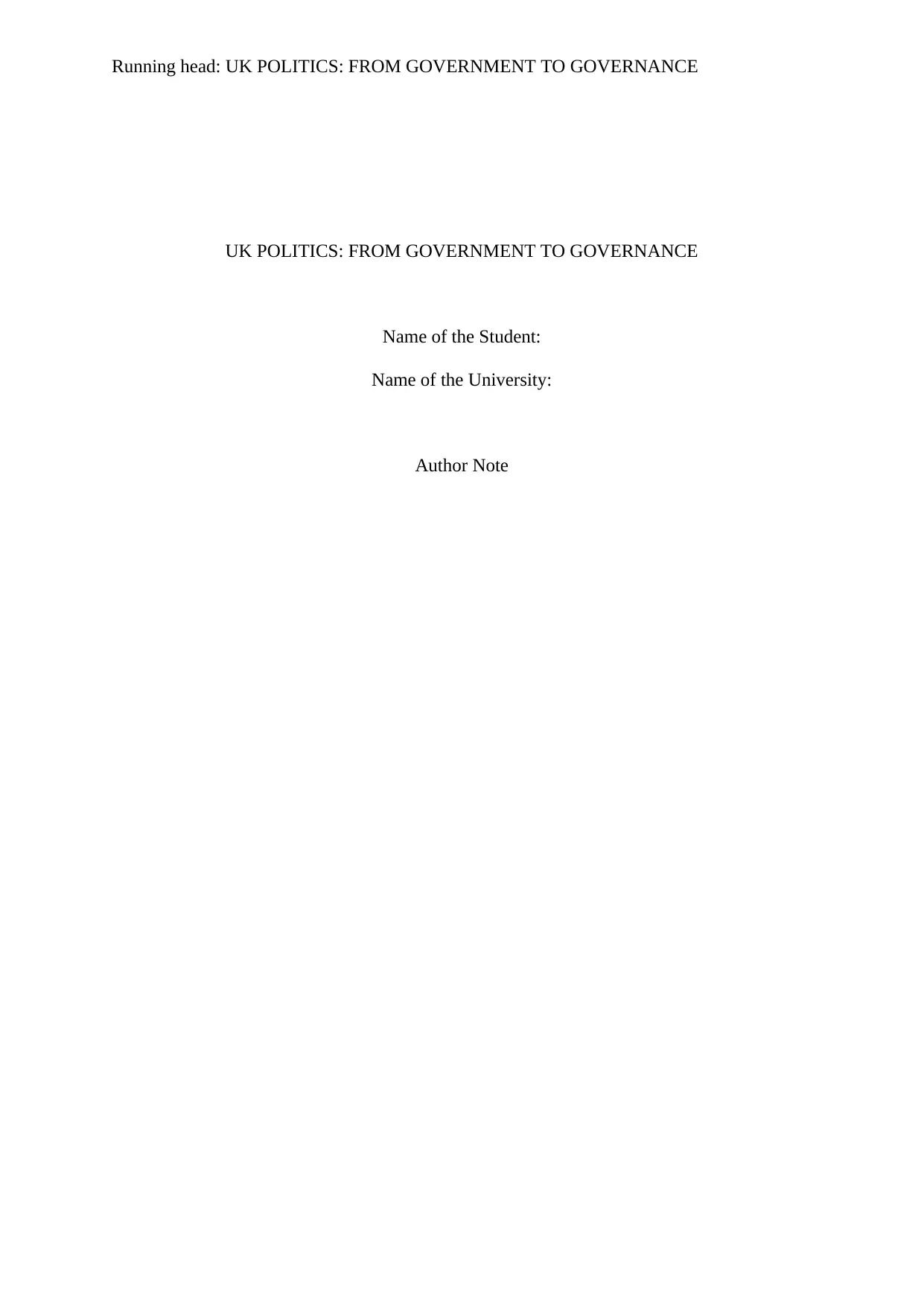
Running head: UK POLITICS: FROM GOVERNMENT TO GOVERNANCE
UK POLITICS: FROM GOVERNMENT TO GOVERNANCE
Name of the Student:
Name of the University:
Author Note
UK POLITICS: FROM GOVERNMENT TO GOVERNANCE
Name of the Student:
Name of the University:
Author Note
Paraphrase This Document
Need a fresh take? Get an instant paraphrase of this document with our AI Paraphraser
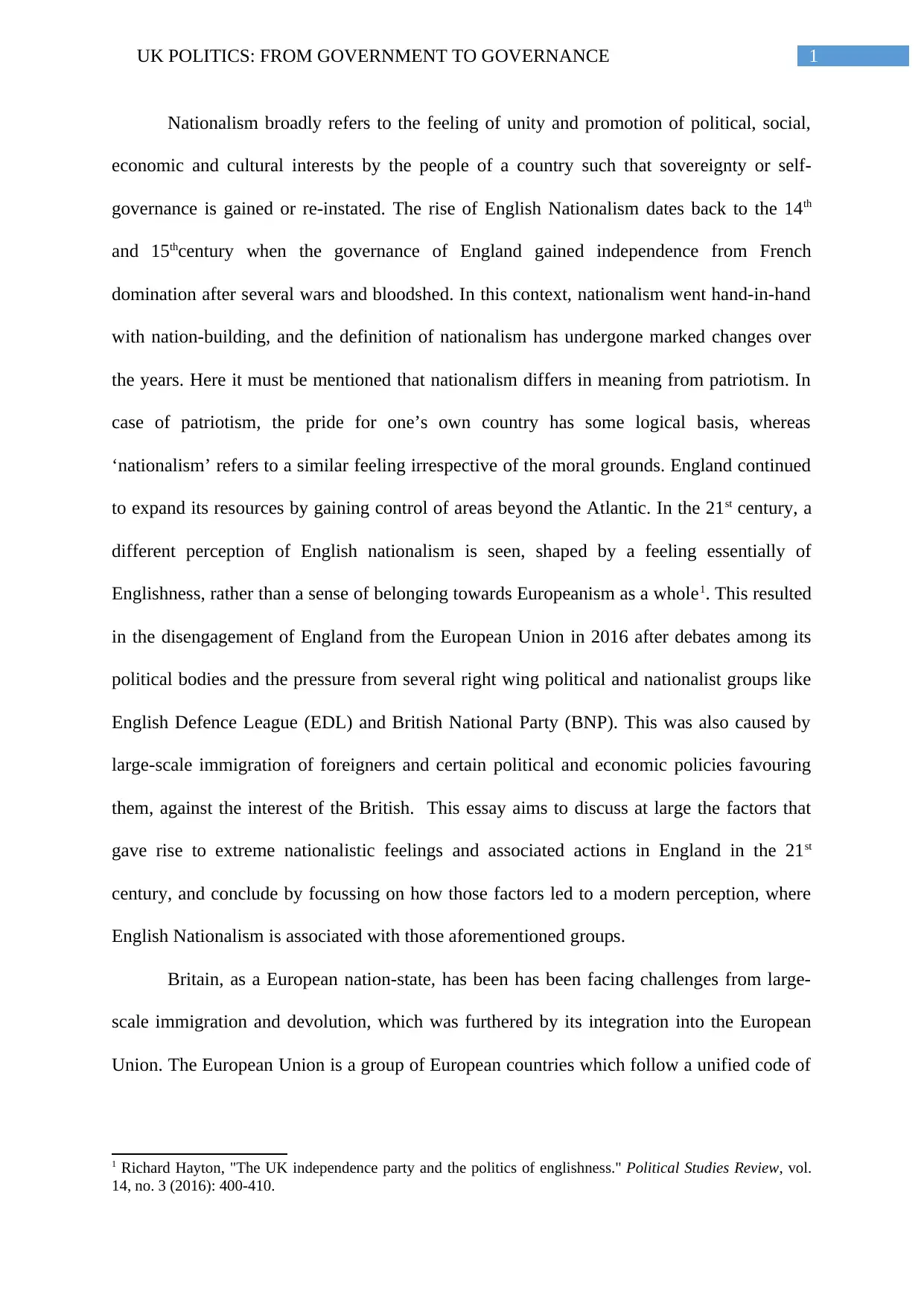
1UK POLITICS: FROM GOVERNMENT TO GOVERNANCE
Nationalism broadly refers to the feeling of unity and promotion of political, social,
economic and cultural interests by the people of a country such that sovereignty or self-
governance is gained or re-instated. The rise of English Nationalism dates back to the 14th
and 15thcentury when the governance of England gained independence from French
domination after several wars and bloodshed. In this context, nationalism went hand-in-hand
with nation-building, and the definition of nationalism has undergone marked changes over
the years. Here it must be mentioned that nationalism differs in meaning from patriotism. In
case of patriotism, the pride for one’s own country has some logical basis, whereas
‘nationalism’ refers to a similar feeling irrespective of the moral grounds. England continued
to expand its resources by gaining control of areas beyond the Atlantic. In the 21st century, a
different perception of English nationalism is seen, shaped by a feeling essentially of
Englishness, rather than a sense of belonging towards Europeanism as a whole1. This resulted
in the disengagement of England from the European Union in 2016 after debates among its
political bodies and the pressure from several right wing political and nationalist groups like
English Defence League (EDL) and British National Party (BNP). This was also caused by
large-scale immigration of foreigners and certain political and economic policies favouring
them, against the interest of the British. This essay aims to discuss at large the factors that
gave rise to extreme nationalistic feelings and associated actions in England in the 21st
century, and conclude by focussing on how those factors led to a modern perception, where
English Nationalism is associated with those aforementioned groups.
Britain, as a European nation-state, has been has been facing challenges from large-
scale immigration and devolution, which was furthered by its integration into the European
Union. The European Union is a group of European countries which follow a unified code of
1 Richard Hayton, "The UK independence party and the politics of englishness." Political Studies Review, vol.
14, no. 3 (2016): 400-410.
Nationalism broadly refers to the feeling of unity and promotion of political, social,
economic and cultural interests by the people of a country such that sovereignty or self-
governance is gained or re-instated. The rise of English Nationalism dates back to the 14th
and 15thcentury when the governance of England gained independence from French
domination after several wars and bloodshed. In this context, nationalism went hand-in-hand
with nation-building, and the definition of nationalism has undergone marked changes over
the years. Here it must be mentioned that nationalism differs in meaning from patriotism. In
case of patriotism, the pride for one’s own country has some logical basis, whereas
‘nationalism’ refers to a similar feeling irrespective of the moral grounds. England continued
to expand its resources by gaining control of areas beyond the Atlantic. In the 21st century, a
different perception of English nationalism is seen, shaped by a feeling essentially of
Englishness, rather than a sense of belonging towards Europeanism as a whole1. This resulted
in the disengagement of England from the European Union in 2016 after debates among its
political bodies and the pressure from several right wing political and nationalist groups like
English Defence League (EDL) and British National Party (BNP). This was also caused by
large-scale immigration of foreigners and certain political and economic policies favouring
them, against the interest of the British. This essay aims to discuss at large the factors that
gave rise to extreme nationalistic feelings and associated actions in England in the 21st
century, and conclude by focussing on how those factors led to a modern perception, where
English Nationalism is associated with those aforementioned groups.
Britain, as a European nation-state, has been has been facing challenges from large-
scale immigration and devolution, which was furthered by its integration into the European
Union. The European Union is a group of European countries which follow a unified code of
1 Richard Hayton, "The UK independence party and the politics of englishness." Political Studies Review, vol.
14, no. 3 (2016): 400-410.
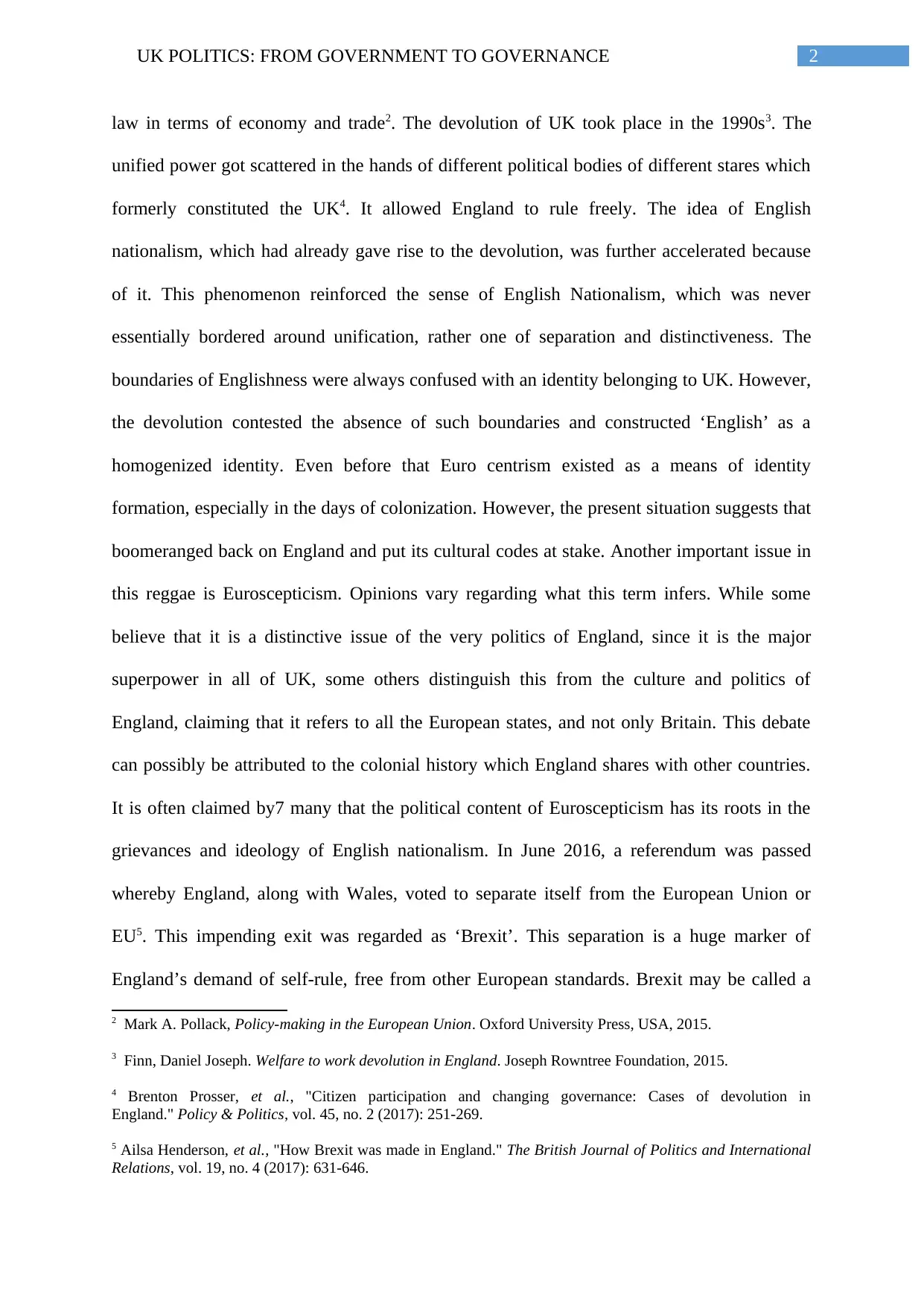
2UK POLITICS: FROM GOVERNMENT TO GOVERNANCE
law in terms of economy and trade2. The devolution of UK took place in the 1990s3. The
unified power got scattered in the hands of different political bodies of different stares which
formerly constituted the UK4. It allowed England to rule freely. The idea of English
nationalism, which had already gave rise to the devolution, was further accelerated because
of it. This phenomenon reinforced the sense of English Nationalism, which was never
essentially bordered around unification, rather one of separation and distinctiveness. The
boundaries of Englishness were always confused with an identity belonging to UK. However,
the devolution contested the absence of such boundaries and constructed ‘English’ as a
homogenized identity. Even before that Euro centrism existed as a means of identity
formation, especially in the days of colonization. However, the present situation suggests that
boomeranged back on England and put its cultural codes at stake. Another important issue in
this reggae is Euroscepticism. Opinions vary regarding what this term infers. While some
believe that it is a distinctive issue of the very politics of England, since it is the major
superpower in all of UK, some others distinguish this from the culture and politics of
England, claiming that it refers to all the European states, and not only Britain. This debate
can possibly be attributed to the colonial history which England shares with other countries.
It is often claimed by7 many that the political content of Euroscepticism has its roots in the
grievances and ideology of English nationalism. In June 2016, a referendum was passed
whereby England, along with Wales, voted to separate itself from the European Union or
EU5. This impending exit was regarded as ‘Brexit’. This separation is a huge marker of
England’s demand of self-rule, free from other European standards. Brexit may be called a
2 Mark A. Pollack, Policy-making in the European Union. Oxford University Press, USA, 2015.
3 Finn, Daniel Joseph. Welfare to work devolution in England. Joseph Rowntree Foundation, 2015.
4 Brenton Prosser, et al., "Citizen participation and changing governance: Cases of devolution in
England." Policy & Politics, vol. 45, no. 2 (2017): 251-269.
5 Ailsa Henderson, et al., "How Brexit was made in England." The British Journal of Politics and International
Relations, vol. 19, no. 4 (2017): 631-646.
law in terms of economy and trade2. The devolution of UK took place in the 1990s3. The
unified power got scattered in the hands of different political bodies of different stares which
formerly constituted the UK4. It allowed England to rule freely. The idea of English
nationalism, which had already gave rise to the devolution, was further accelerated because
of it. This phenomenon reinforced the sense of English Nationalism, which was never
essentially bordered around unification, rather one of separation and distinctiveness. The
boundaries of Englishness were always confused with an identity belonging to UK. However,
the devolution contested the absence of such boundaries and constructed ‘English’ as a
homogenized identity. Even before that Euro centrism existed as a means of identity
formation, especially in the days of colonization. However, the present situation suggests that
boomeranged back on England and put its cultural codes at stake. Another important issue in
this reggae is Euroscepticism. Opinions vary regarding what this term infers. While some
believe that it is a distinctive issue of the very politics of England, since it is the major
superpower in all of UK, some others distinguish this from the culture and politics of
England, claiming that it refers to all the European states, and not only Britain. This debate
can possibly be attributed to the colonial history which England shares with other countries.
It is often claimed by7 many that the political content of Euroscepticism has its roots in the
grievances and ideology of English nationalism. In June 2016, a referendum was passed
whereby England, along with Wales, voted to separate itself from the European Union or
EU5. This impending exit was regarded as ‘Brexit’. This separation is a huge marker of
England’s demand of self-rule, free from other European standards. Brexit may be called a
2 Mark A. Pollack, Policy-making in the European Union. Oxford University Press, USA, 2015.
3 Finn, Daniel Joseph. Welfare to work devolution in England. Joseph Rowntree Foundation, 2015.
4 Brenton Prosser, et al., "Citizen participation and changing governance: Cases of devolution in
England." Policy & Politics, vol. 45, no. 2 (2017): 251-269.
5 Ailsa Henderson, et al., "How Brexit was made in England." The British Journal of Politics and International
Relations, vol. 19, no. 4 (2017): 631-646.
⊘ This is a preview!⊘
Do you want full access?
Subscribe today to unlock all pages.

Trusted by 1+ million students worldwide
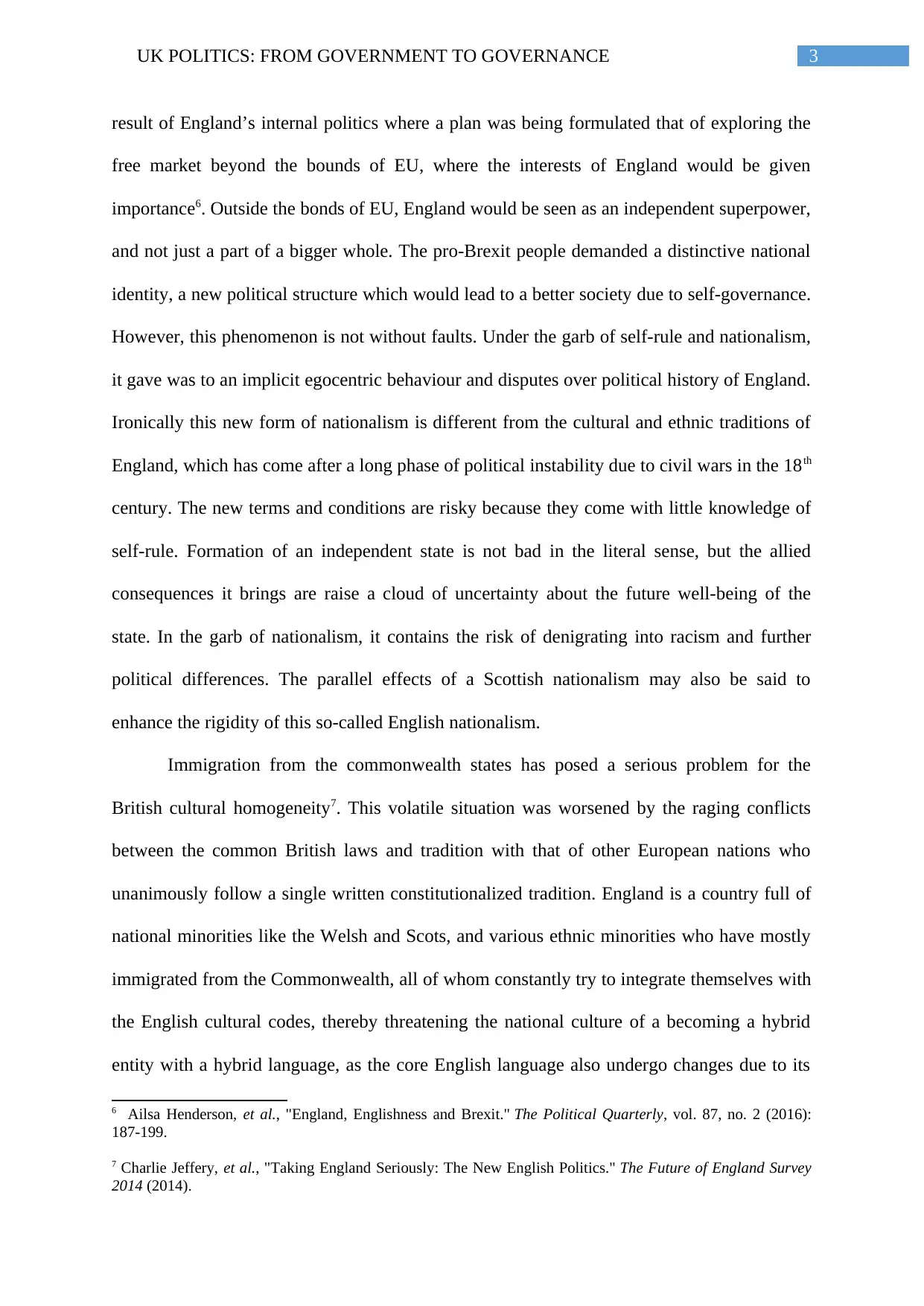
3UK POLITICS: FROM GOVERNMENT TO GOVERNANCE
result of England’s internal politics where a plan was being formulated that of exploring the
free market beyond the bounds of EU, where the interests of England would be given
importance6. Outside the bonds of EU, England would be seen as an independent superpower,
and not just a part of a bigger whole. The pro-Brexit people demanded a distinctive national
identity, a new political structure which would lead to a better society due to self-governance.
However, this phenomenon is not without faults. Under the garb of self-rule and nationalism,
it gave was to an implicit egocentric behaviour and disputes over political history of England.
Ironically this new form of nationalism is different from the cultural and ethnic traditions of
England, which has come after a long phase of political instability due to civil wars in the 18th
century. The new terms and conditions are risky because they come with little knowledge of
self-rule. Formation of an independent state is not bad in the literal sense, but the allied
consequences it brings are raise a cloud of uncertainty about the future well-being of the
state. In the garb of nationalism, it contains the risk of denigrating into racism and further
political differences. The parallel effects of a Scottish nationalism may also be said to
enhance the rigidity of this so-called English nationalism.
Immigration from the commonwealth states has posed a serious problem for the
British cultural homogeneity7. This volatile situation was worsened by the raging conflicts
between the common British laws and tradition with that of other European nations who
unanimously follow a single written constitutionalized tradition. England is a country full of
national minorities like the Welsh and Scots, and various ethnic minorities who have mostly
immigrated from the Commonwealth, all of whom constantly try to integrate themselves with
the English cultural codes, thereby threatening the national culture of a becoming a hybrid
entity with a hybrid language, as the core English language also undergo changes due to its
6 Ailsa Henderson, et al., "England, Englishness and Brexit." The Political Quarterly, vol. 87, no. 2 (2016):
187-199.
7 Charlie Jeffery, et al., "Taking England Seriously: The New English Politics." The Future of England Survey
2014 (2014).
result of England’s internal politics where a plan was being formulated that of exploring the
free market beyond the bounds of EU, where the interests of England would be given
importance6. Outside the bonds of EU, England would be seen as an independent superpower,
and not just a part of a bigger whole. The pro-Brexit people demanded a distinctive national
identity, a new political structure which would lead to a better society due to self-governance.
However, this phenomenon is not without faults. Under the garb of self-rule and nationalism,
it gave was to an implicit egocentric behaviour and disputes over political history of England.
Ironically this new form of nationalism is different from the cultural and ethnic traditions of
England, which has come after a long phase of political instability due to civil wars in the 18th
century. The new terms and conditions are risky because they come with little knowledge of
self-rule. Formation of an independent state is not bad in the literal sense, but the allied
consequences it brings are raise a cloud of uncertainty about the future well-being of the
state. In the garb of nationalism, it contains the risk of denigrating into racism and further
political differences. The parallel effects of a Scottish nationalism may also be said to
enhance the rigidity of this so-called English nationalism.
Immigration from the commonwealth states has posed a serious problem for the
British cultural homogeneity7. This volatile situation was worsened by the raging conflicts
between the common British laws and tradition with that of other European nations who
unanimously follow a single written constitutionalized tradition. England is a country full of
national minorities like the Welsh and Scots, and various ethnic minorities who have mostly
immigrated from the Commonwealth, all of whom constantly try to integrate themselves with
the English cultural codes, thereby threatening the national culture of a becoming a hybrid
entity with a hybrid language, as the core English language also undergo changes due to its
6 Ailsa Henderson, et al., "England, Englishness and Brexit." The Political Quarterly, vol. 87, no. 2 (2016):
187-199.
7 Charlie Jeffery, et al., "Taking England Seriously: The New English Politics." The Future of England Survey
2014 (2014).
Paraphrase This Document
Need a fresh take? Get an instant paraphrase of this document with our AI Paraphraser
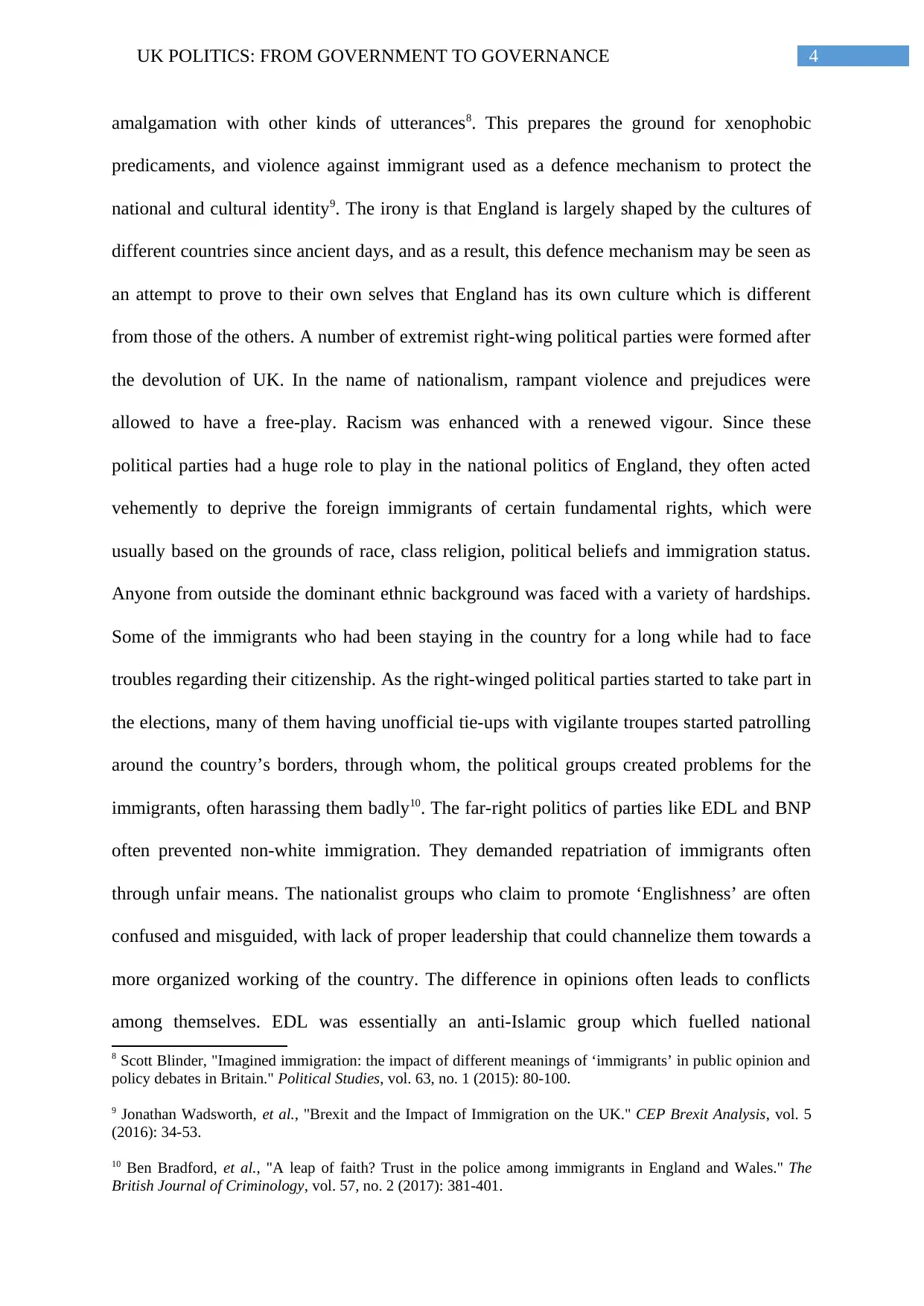
4UK POLITICS: FROM GOVERNMENT TO GOVERNANCE
amalgamation with other kinds of utterances8. This prepares the ground for xenophobic
predicaments, and violence against immigrant used as a defence mechanism to protect the
national and cultural identity9. The irony is that England is largely shaped by the cultures of
different countries since ancient days, and as a result, this defence mechanism may be seen as
an attempt to prove to their own selves that England has its own culture which is different
from those of the others. A number of extremist right-wing political parties were formed after
the devolution of UK. In the name of nationalism, rampant violence and prejudices were
allowed to have a free-play. Racism was enhanced with a renewed vigour. Since these
political parties had a huge role to play in the national politics of England, they often acted
vehemently to deprive the foreign immigrants of certain fundamental rights, which were
usually based on the grounds of race, class religion, political beliefs and immigration status.
Anyone from outside the dominant ethnic background was faced with a variety of hardships.
Some of the immigrants who had been staying in the country for a long while had to face
troubles regarding their citizenship. As the right-winged political parties started to take part in
the elections, many of them having unofficial tie-ups with vigilante troupes started patrolling
around the country’s borders, through whom, the political groups created problems for the
immigrants, often harassing them badly10. The far-right politics of parties like EDL and BNP
often prevented non-white immigration. They demanded repatriation of immigrants often
through unfair means. The nationalist groups who claim to promote ‘Englishness’ are often
confused and misguided, with lack of proper leadership that could channelize them towards a
more organized working of the country. The difference in opinions often leads to conflicts
among themselves. EDL was essentially an anti-Islamic group which fuelled national
8 Scott Blinder, "Imagined immigration: the impact of different meanings of ‘immigrants’ in public opinion and
policy debates in Britain." Political Studies, vol. 63, no. 1 (2015): 80-100.
9 Jonathan Wadsworth, et al., "Brexit and the Impact of Immigration on the UK." CEP Brexit Analysis, vol. 5
(2016): 34-53.
10 Ben Bradford, et al., "A leap of faith? Trust in the police among immigrants in England and Wales." The
British Journal of Criminology, vol. 57, no. 2 (2017): 381-401.
amalgamation with other kinds of utterances8. This prepares the ground for xenophobic
predicaments, and violence against immigrant used as a defence mechanism to protect the
national and cultural identity9. The irony is that England is largely shaped by the cultures of
different countries since ancient days, and as a result, this defence mechanism may be seen as
an attempt to prove to their own selves that England has its own culture which is different
from those of the others. A number of extremist right-wing political parties were formed after
the devolution of UK. In the name of nationalism, rampant violence and prejudices were
allowed to have a free-play. Racism was enhanced with a renewed vigour. Since these
political parties had a huge role to play in the national politics of England, they often acted
vehemently to deprive the foreign immigrants of certain fundamental rights, which were
usually based on the grounds of race, class religion, political beliefs and immigration status.
Anyone from outside the dominant ethnic background was faced with a variety of hardships.
Some of the immigrants who had been staying in the country for a long while had to face
troubles regarding their citizenship. As the right-winged political parties started to take part in
the elections, many of them having unofficial tie-ups with vigilante troupes started patrolling
around the country’s borders, through whom, the political groups created problems for the
immigrants, often harassing them badly10. The far-right politics of parties like EDL and BNP
often prevented non-white immigration. They demanded repatriation of immigrants often
through unfair means. The nationalist groups who claim to promote ‘Englishness’ are often
confused and misguided, with lack of proper leadership that could channelize them towards a
more organized working of the country. The difference in opinions often leads to conflicts
among themselves. EDL was essentially an anti-Islamic group which fuelled national
8 Scott Blinder, "Imagined immigration: the impact of different meanings of ‘immigrants’ in public opinion and
policy debates in Britain." Political Studies, vol. 63, no. 1 (2015): 80-100.
9 Jonathan Wadsworth, et al., "Brexit and the Impact of Immigration on the UK." CEP Brexit Analysis, vol. 5
(2016): 34-53.
10 Ben Bradford, et al., "A leap of faith? Trust in the police among immigrants in England and Wales." The
British Journal of Criminology, vol. 57, no. 2 (2017): 381-401.
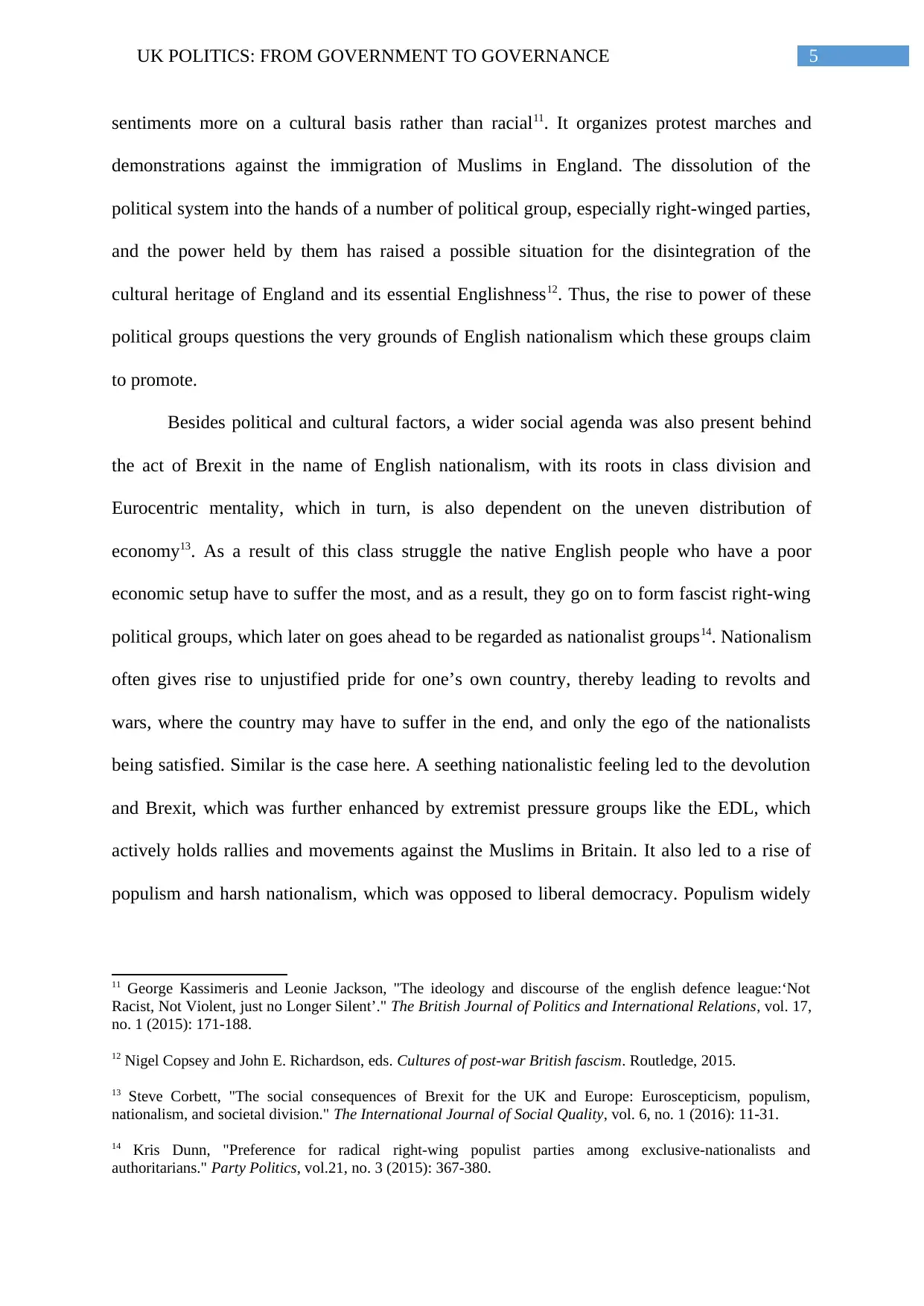
5UK POLITICS: FROM GOVERNMENT TO GOVERNANCE
sentiments more on a cultural basis rather than racial11. It organizes protest marches and
demonstrations against the immigration of Muslims in England. The dissolution of the
political system into the hands of a number of political group, especially right-winged parties,
and the power held by them has raised a possible situation for the disintegration of the
cultural heritage of England and its essential Englishness12. Thus, the rise to power of these
political groups questions the very grounds of English nationalism which these groups claim
to promote.
Besides political and cultural factors, a wider social agenda was also present behind
the act of Brexit in the name of English nationalism, with its roots in class division and
Eurocentric mentality, which in turn, is also dependent on the uneven distribution of
economy13. As a result of this class struggle the native English people who have a poor
economic setup have to suffer the most, and as a result, they go on to form fascist right-wing
political groups, which later on goes ahead to be regarded as nationalist groups14. Nationalism
often gives rise to unjustified pride for one’s own country, thereby leading to revolts and
wars, where the country may have to suffer in the end, and only the ego of the nationalists
being satisfied. Similar is the case here. A seething nationalistic feeling led to the devolution
and Brexit, which was further enhanced by extremist pressure groups like the EDL, which
actively holds rallies and movements against the Muslims in Britain. It also led to a rise of
populism and harsh nationalism, which was opposed to liberal democracy. Populism widely
11 George Kassimeris and Leonie Jackson, "The ideology and discourse of the english defence league:‘Not
Racist, Not Violent, just no Longer Silent’." The British Journal of Politics and International Relations, vol. 17,
no. 1 (2015): 171-188.
12 Nigel Copsey and John E. Richardson, eds. Cultures of post-war British fascism. Routledge, 2015.
13 Steve Corbett, "The social consequences of Brexit for the UK and Europe: Euroscepticism, populism,
nationalism, and societal division." The International Journal of Social Quality, vol. 6, no. 1 (2016): 11-31.
14 Kris Dunn, "Preference for radical right-wing populist parties among exclusive-nationalists and
authoritarians." Party Politics, vol.21, no. 3 (2015): 367-380.
sentiments more on a cultural basis rather than racial11. It organizes protest marches and
demonstrations against the immigration of Muslims in England. The dissolution of the
political system into the hands of a number of political group, especially right-winged parties,
and the power held by them has raised a possible situation for the disintegration of the
cultural heritage of England and its essential Englishness12. Thus, the rise to power of these
political groups questions the very grounds of English nationalism which these groups claim
to promote.
Besides political and cultural factors, a wider social agenda was also present behind
the act of Brexit in the name of English nationalism, with its roots in class division and
Eurocentric mentality, which in turn, is also dependent on the uneven distribution of
economy13. As a result of this class struggle the native English people who have a poor
economic setup have to suffer the most, and as a result, they go on to form fascist right-wing
political groups, which later on goes ahead to be regarded as nationalist groups14. Nationalism
often gives rise to unjustified pride for one’s own country, thereby leading to revolts and
wars, where the country may have to suffer in the end, and only the ego of the nationalists
being satisfied. Similar is the case here. A seething nationalistic feeling led to the devolution
and Brexit, which was further enhanced by extremist pressure groups like the EDL, which
actively holds rallies and movements against the Muslims in Britain. It also led to a rise of
populism and harsh nationalism, which was opposed to liberal democracy. Populism widely
11 George Kassimeris and Leonie Jackson, "The ideology and discourse of the english defence league:‘Not
Racist, Not Violent, just no Longer Silent’." The British Journal of Politics and International Relations, vol. 17,
no. 1 (2015): 171-188.
12 Nigel Copsey and John E. Richardson, eds. Cultures of post-war British fascism. Routledge, 2015.
13 Steve Corbett, "The social consequences of Brexit for the UK and Europe: Euroscepticism, populism,
nationalism, and societal division." The International Journal of Social Quality, vol. 6, no. 1 (2016): 11-31.
14 Kris Dunn, "Preference for radical right-wing populist parties among exclusive-nationalists and
authoritarians." Party Politics, vol.21, no. 3 (2015): 367-380.
⊘ This is a preview!⊘
Do you want full access?
Subscribe today to unlock all pages.

Trusted by 1+ million students worldwide
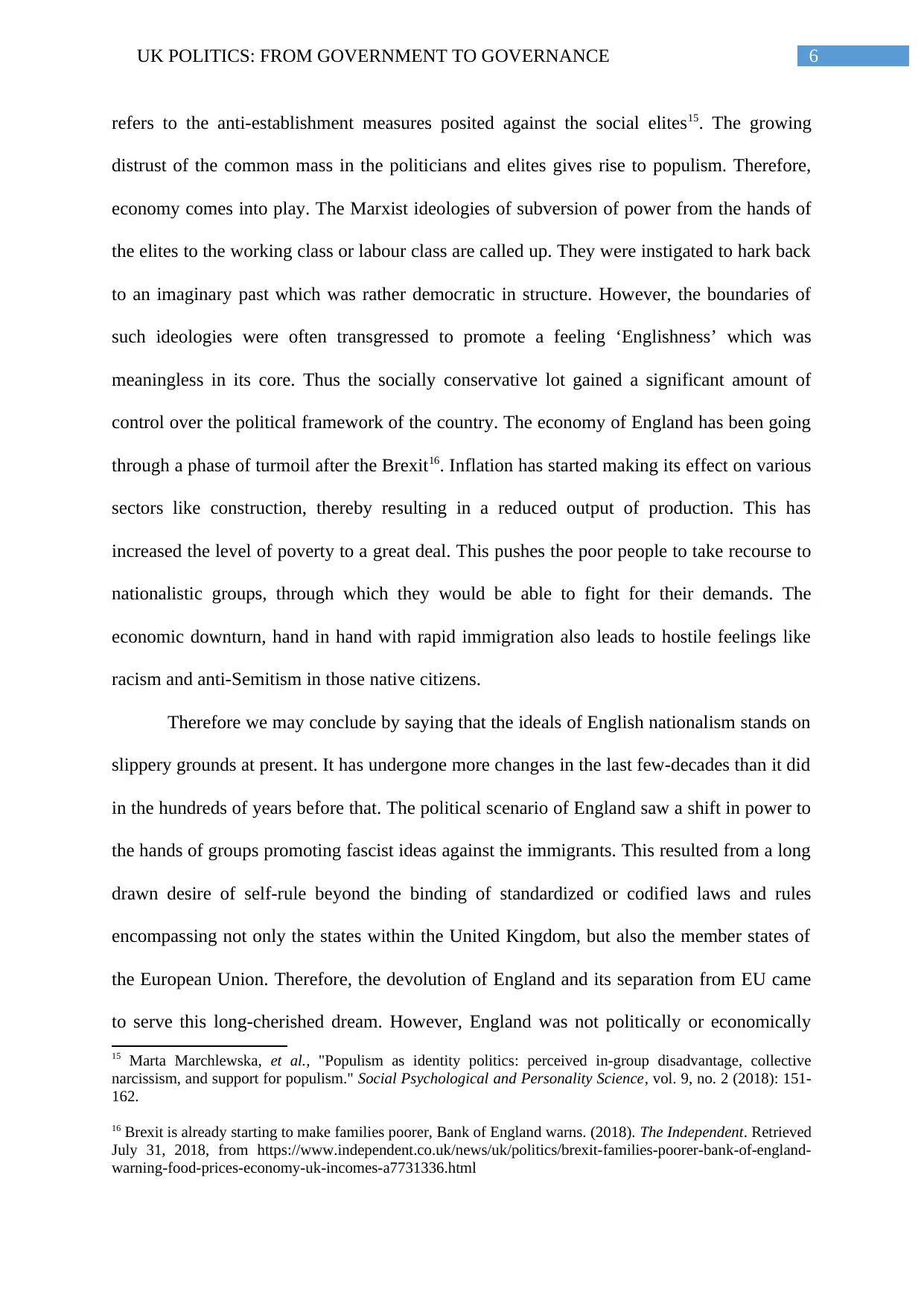
6UK POLITICS: FROM GOVERNMENT TO GOVERNANCE
refers to the anti-establishment measures posited against the social elites15. The growing
distrust of the common mass in the politicians and elites gives rise to populism. Therefore,
economy comes into play. The Marxist ideologies of subversion of power from the hands of
the elites to the working class or labour class are called up. They were instigated to hark back
to an imaginary past which was rather democratic in structure. However, the boundaries of
such ideologies were often transgressed to promote a feeling ‘Englishness’ which was
meaningless in its core. Thus the socially conservative lot gained a significant amount of
control over the political framework of the country. The economy of England has been going
through a phase of turmoil after the Brexit16. Inflation has started making its effect on various
sectors like construction, thereby resulting in a reduced output of production. This has
increased the level of poverty to a great deal. This pushes the poor people to take recourse to
nationalistic groups, through which they would be able to fight for their demands. The
economic downturn, hand in hand with rapid immigration also leads to hostile feelings like
racism and anti-Semitism in those native citizens.
Therefore we may conclude by saying that the ideals of English nationalism stands on
slippery grounds at present. It has undergone more changes in the last few-decades than it did
in the hundreds of years before that. The political scenario of England saw a shift in power to
the hands of groups promoting fascist ideas against the immigrants. This resulted from a long
drawn desire of self-rule beyond the binding of standardized or codified laws and rules
encompassing not only the states within the United Kingdom, but also the member states of
the European Union. Therefore, the devolution of England and its separation from EU came
to serve this long-cherished dream. However, England was not politically or economically
15 Marta Marchlewska, et al., "Populism as identity politics: perceived in-group disadvantage, collective
narcissism, and support for populism." Social Psychological and Personality Science, vol. 9, no. 2 (2018): 151-
162.
16 Brexit is already starting to make families poorer, Bank of England warns. (2018). The Independent. Retrieved
July 31, 2018, from https://www.independent.co.uk/news/uk/politics/brexit-families-poorer-bank-of-england-
warning-food-prices-economy-uk-incomes-a7731336.html
refers to the anti-establishment measures posited against the social elites15. The growing
distrust of the common mass in the politicians and elites gives rise to populism. Therefore,
economy comes into play. The Marxist ideologies of subversion of power from the hands of
the elites to the working class or labour class are called up. They were instigated to hark back
to an imaginary past which was rather democratic in structure. However, the boundaries of
such ideologies were often transgressed to promote a feeling ‘Englishness’ which was
meaningless in its core. Thus the socially conservative lot gained a significant amount of
control over the political framework of the country. The economy of England has been going
through a phase of turmoil after the Brexit16. Inflation has started making its effect on various
sectors like construction, thereby resulting in a reduced output of production. This has
increased the level of poverty to a great deal. This pushes the poor people to take recourse to
nationalistic groups, through which they would be able to fight for their demands. The
economic downturn, hand in hand with rapid immigration also leads to hostile feelings like
racism and anti-Semitism in those native citizens.
Therefore we may conclude by saying that the ideals of English nationalism stands on
slippery grounds at present. It has undergone more changes in the last few-decades than it did
in the hundreds of years before that. The political scenario of England saw a shift in power to
the hands of groups promoting fascist ideas against the immigrants. This resulted from a long
drawn desire of self-rule beyond the binding of standardized or codified laws and rules
encompassing not only the states within the United Kingdom, but also the member states of
the European Union. Therefore, the devolution of England and its separation from EU came
to serve this long-cherished dream. However, England was not politically or economically
15 Marta Marchlewska, et al., "Populism as identity politics: perceived in-group disadvantage, collective
narcissism, and support for populism." Social Psychological and Personality Science, vol. 9, no. 2 (2018): 151-
162.
16 Brexit is already starting to make families poorer, Bank of England warns. (2018). The Independent. Retrieved
July 31, 2018, from https://www.independent.co.uk/news/uk/politics/brexit-families-poorer-bank-of-england-
warning-food-prices-economy-uk-incomes-a7731336.html
Paraphrase This Document
Need a fresh take? Get an instant paraphrase of this document with our AI Paraphraser
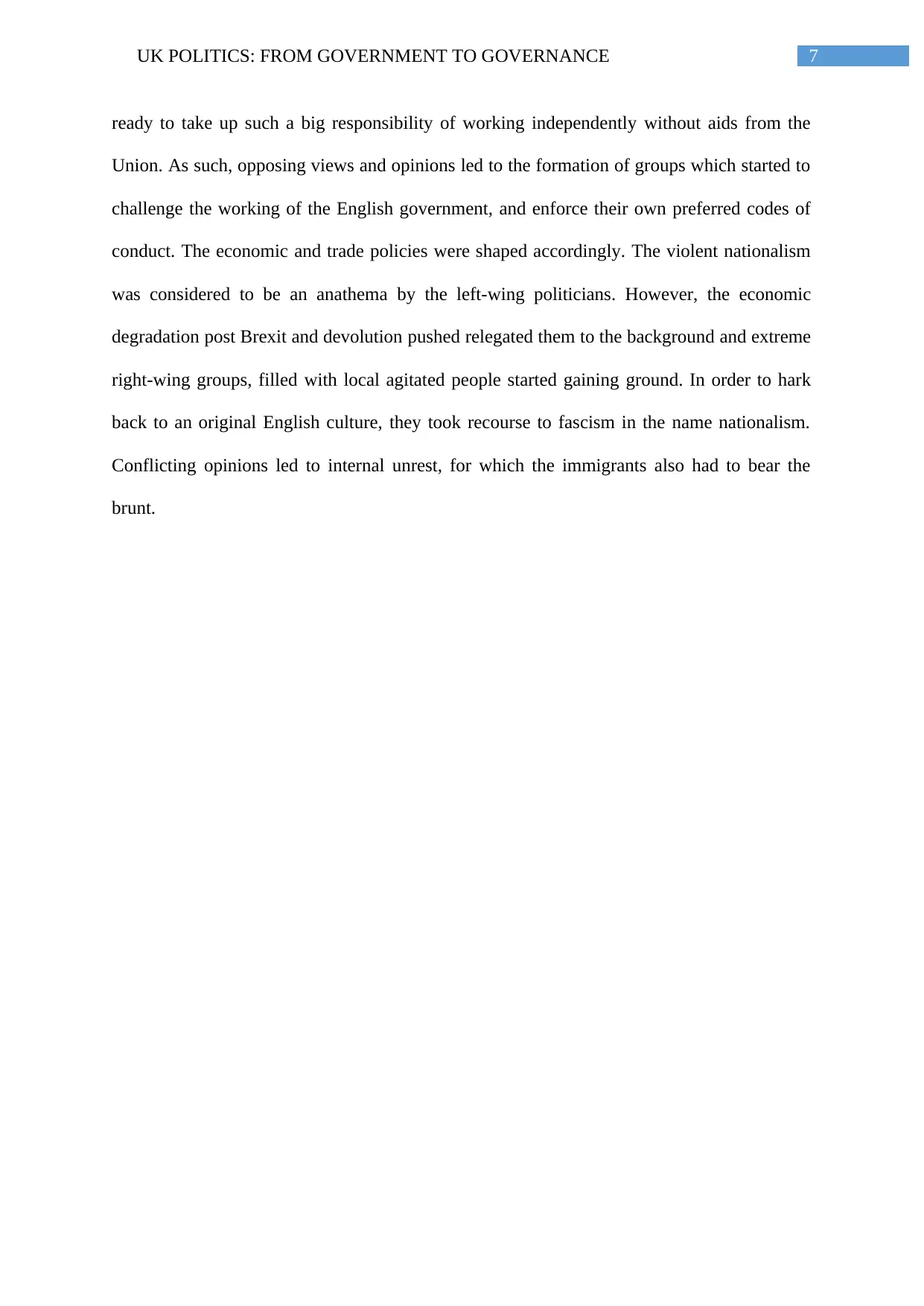
7UK POLITICS: FROM GOVERNMENT TO GOVERNANCE
ready to take up such a big responsibility of working independently without aids from the
Union. As such, opposing views and opinions led to the formation of groups which started to
challenge the working of the English government, and enforce their own preferred codes of
conduct. The economic and trade policies were shaped accordingly. The violent nationalism
was considered to be an anathema by the left-wing politicians. However, the economic
degradation post Brexit and devolution pushed relegated them to the background and extreme
right-wing groups, filled with local agitated people started gaining ground. In order to hark
back to an original English culture, they took recourse to fascism in the name nationalism.
Conflicting opinions led to internal unrest, for which the immigrants also had to bear the
brunt.
ready to take up such a big responsibility of working independently without aids from the
Union. As such, opposing views and opinions led to the formation of groups which started to
challenge the working of the English government, and enforce their own preferred codes of
conduct. The economic and trade policies were shaped accordingly. The violent nationalism
was considered to be an anathema by the left-wing politicians. However, the economic
degradation post Brexit and devolution pushed relegated them to the background and extreme
right-wing groups, filled with local agitated people started gaining ground. In order to hark
back to an original English culture, they took recourse to fascism in the name nationalism.
Conflicting opinions led to internal unrest, for which the immigrants also had to bear the
brunt.
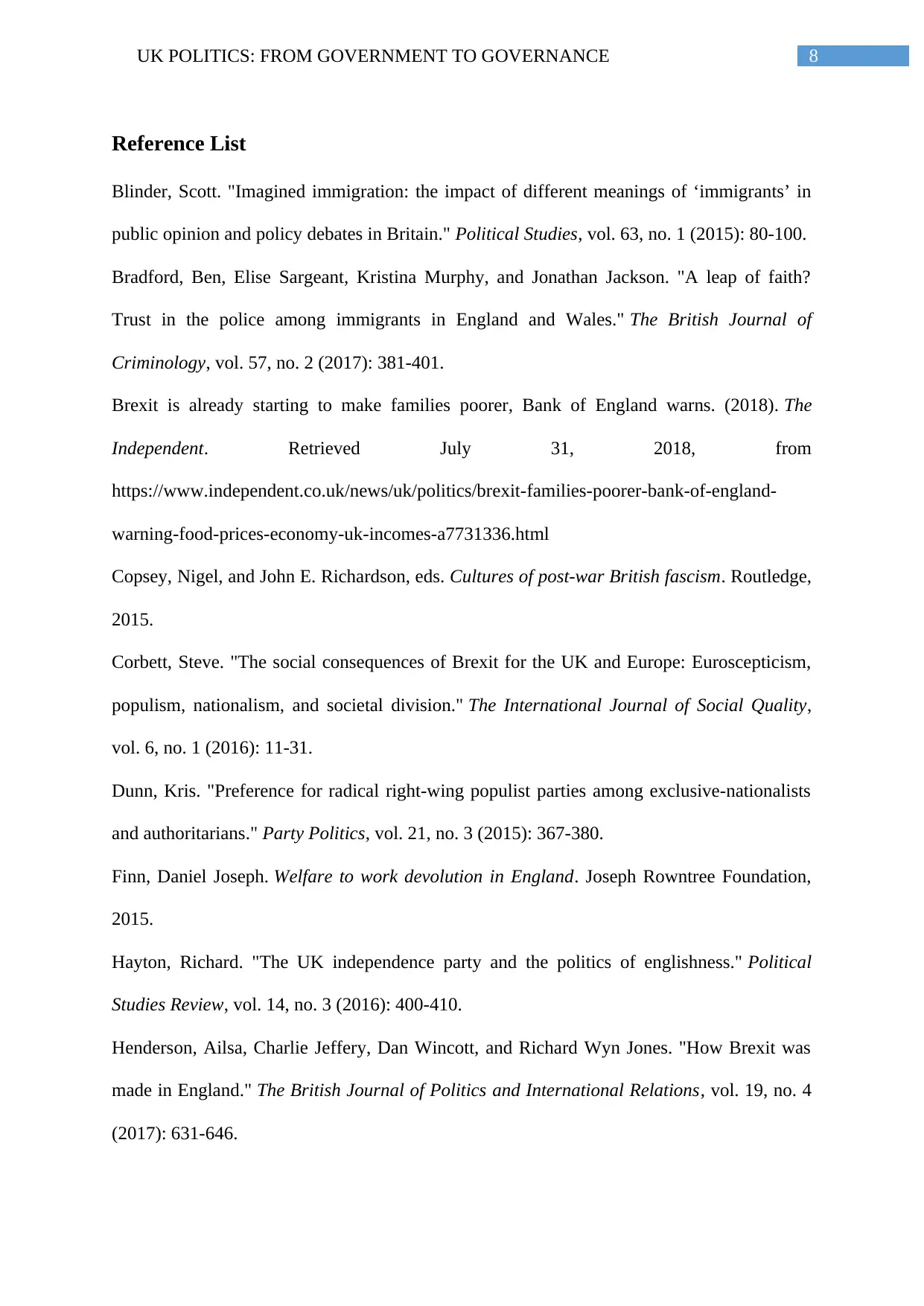
8UK POLITICS: FROM GOVERNMENT TO GOVERNANCE
Reference List
Blinder, Scott. "Imagined immigration: the impact of different meanings of ‘immigrants’ in
public opinion and policy debates in Britain." Political Studies, vol. 63, no. 1 (2015): 80-100.
Bradford, Ben, Elise Sargeant, Kristina Murphy, and Jonathan Jackson. "A leap of faith?
Trust in the police among immigrants in England and Wales." The British Journal of
Criminology, vol. 57, no. 2 (2017): 381-401.
Brexit is already starting to make families poorer, Bank of England warns. (2018). The
Independent. Retrieved July 31, 2018, from
https://www.independent.co.uk/news/uk/politics/brexit-families-poorer-bank-of-england-
warning-food-prices-economy-uk-incomes-a7731336.html
Copsey, Nigel, and John E. Richardson, eds. Cultures of post-war British fascism. Routledge,
2015.
Corbett, Steve. "The social consequences of Brexit for the UK and Europe: Euroscepticism,
populism, nationalism, and societal division." The International Journal of Social Quality,
vol. 6, no. 1 (2016): 11-31.
Dunn, Kris. "Preference for radical right-wing populist parties among exclusive-nationalists
and authoritarians." Party Politics, vol. 21, no. 3 (2015): 367-380.
Finn, Daniel Joseph. Welfare to work devolution in England. Joseph Rowntree Foundation,
2015.
Hayton, Richard. "The UK independence party and the politics of englishness." Political
Studies Review, vol. 14, no. 3 (2016): 400-410.
Henderson, Ailsa, Charlie Jeffery, Dan Wincott, and Richard Wyn Jones. "How Brexit was
made in England." The British Journal of Politics and International Relations, vol. 19, no. 4
(2017): 631-646.
Reference List
Blinder, Scott. "Imagined immigration: the impact of different meanings of ‘immigrants’ in
public opinion and policy debates in Britain." Political Studies, vol. 63, no. 1 (2015): 80-100.
Bradford, Ben, Elise Sargeant, Kristina Murphy, and Jonathan Jackson. "A leap of faith?
Trust in the police among immigrants in England and Wales." The British Journal of
Criminology, vol. 57, no. 2 (2017): 381-401.
Brexit is already starting to make families poorer, Bank of England warns. (2018). The
Independent. Retrieved July 31, 2018, from
https://www.independent.co.uk/news/uk/politics/brexit-families-poorer-bank-of-england-
warning-food-prices-economy-uk-incomes-a7731336.html
Copsey, Nigel, and John E. Richardson, eds. Cultures of post-war British fascism. Routledge,
2015.
Corbett, Steve. "The social consequences of Brexit for the UK and Europe: Euroscepticism,
populism, nationalism, and societal division." The International Journal of Social Quality,
vol. 6, no. 1 (2016): 11-31.
Dunn, Kris. "Preference for radical right-wing populist parties among exclusive-nationalists
and authoritarians." Party Politics, vol. 21, no. 3 (2015): 367-380.
Finn, Daniel Joseph. Welfare to work devolution in England. Joseph Rowntree Foundation,
2015.
Hayton, Richard. "The UK independence party and the politics of englishness." Political
Studies Review, vol. 14, no. 3 (2016): 400-410.
Henderson, Ailsa, Charlie Jeffery, Dan Wincott, and Richard Wyn Jones. "How Brexit was
made in England." The British Journal of Politics and International Relations, vol. 19, no. 4
(2017): 631-646.
⊘ This is a preview!⊘
Do you want full access?
Subscribe today to unlock all pages.

Trusted by 1+ million students worldwide
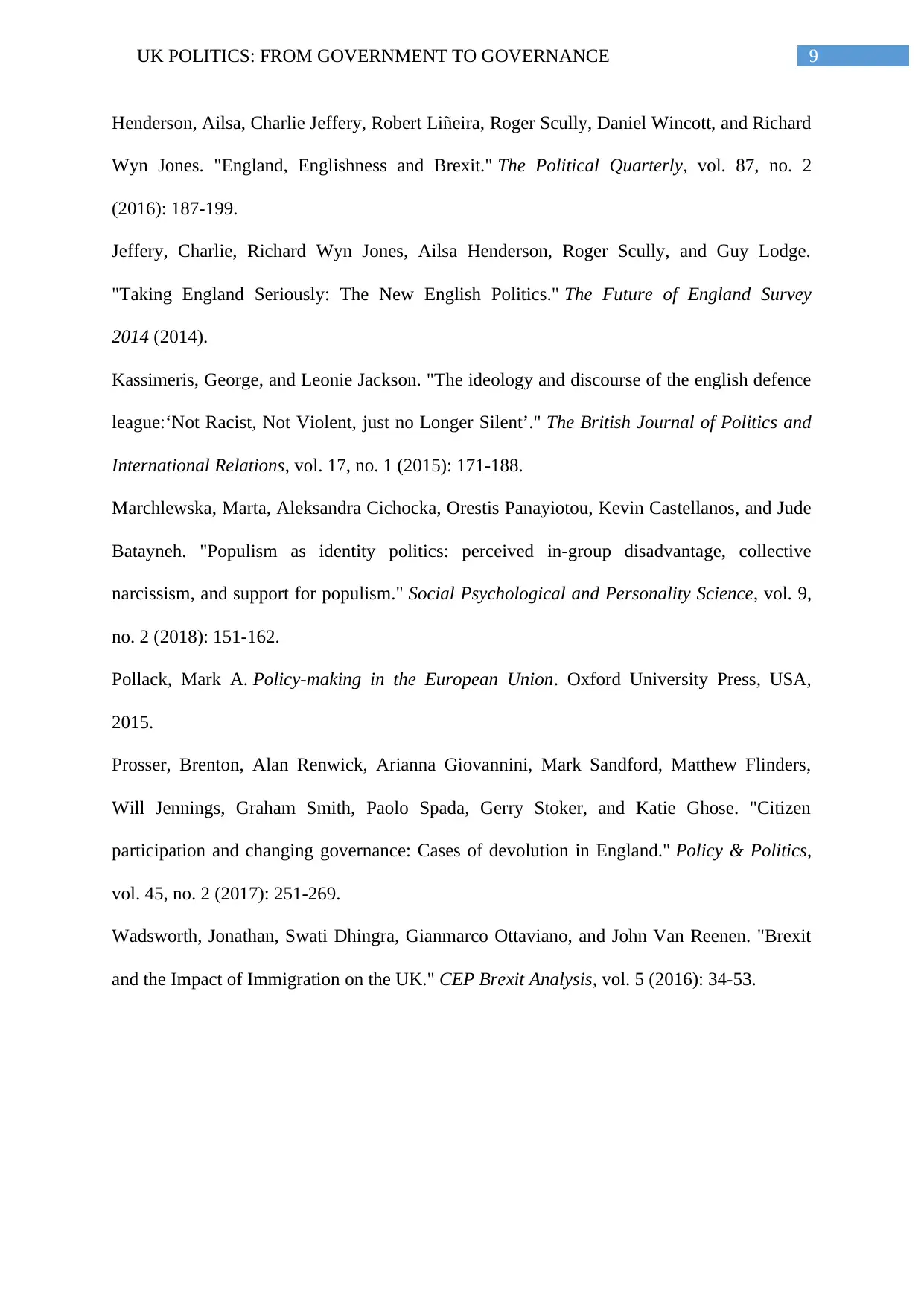
9UK POLITICS: FROM GOVERNMENT TO GOVERNANCE
Henderson, Ailsa, Charlie Jeffery, Robert Liñeira, Roger Scully, Daniel Wincott, and Richard
Wyn Jones. "England, Englishness and Brexit." The Political Quarterly, vol. 87, no. 2
(2016): 187-199.
Jeffery, Charlie, Richard Wyn Jones, Ailsa Henderson, Roger Scully, and Guy Lodge.
"Taking England Seriously: The New English Politics." The Future of England Survey
2014 (2014).
Kassimeris, George, and Leonie Jackson. "The ideology and discourse of the english defence
league:‘Not Racist, Not Violent, just no Longer Silent’." The British Journal of Politics and
International Relations, vol. 17, no. 1 (2015): 171-188.
Marchlewska, Marta, Aleksandra Cichocka, Orestis Panayiotou, Kevin Castellanos, and Jude
Batayneh. "Populism as identity politics: perceived in-group disadvantage, collective
narcissism, and support for populism." Social Psychological and Personality Science, vol. 9,
no. 2 (2018): 151-162.
Pollack, Mark A. Policy-making in the European Union. Oxford University Press, USA,
2015.
Prosser, Brenton, Alan Renwick, Arianna Giovannini, Mark Sandford, Matthew Flinders,
Will Jennings, Graham Smith, Paolo Spada, Gerry Stoker, and Katie Ghose. "Citizen
participation and changing governance: Cases of devolution in England." Policy & Politics,
vol. 45, no. 2 (2017): 251-269.
Wadsworth, Jonathan, Swati Dhingra, Gianmarco Ottaviano, and John Van Reenen. "Brexit
and the Impact of Immigration on the UK." CEP Brexit Analysis, vol. 5 (2016): 34-53.
Henderson, Ailsa, Charlie Jeffery, Robert Liñeira, Roger Scully, Daniel Wincott, and Richard
Wyn Jones. "England, Englishness and Brexit." The Political Quarterly, vol. 87, no. 2
(2016): 187-199.
Jeffery, Charlie, Richard Wyn Jones, Ailsa Henderson, Roger Scully, and Guy Lodge.
"Taking England Seriously: The New English Politics." The Future of England Survey
2014 (2014).
Kassimeris, George, and Leonie Jackson. "The ideology and discourse of the english defence
league:‘Not Racist, Not Violent, just no Longer Silent’." The British Journal of Politics and
International Relations, vol. 17, no. 1 (2015): 171-188.
Marchlewska, Marta, Aleksandra Cichocka, Orestis Panayiotou, Kevin Castellanos, and Jude
Batayneh. "Populism as identity politics: perceived in-group disadvantage, collective
narcissism, and support for populism." Social Psychological and Personality Science, vol. 9,
no. 2 (2018): 151-162.
Pollack, Mark A. Policy-making in the European Union. Oxford University Press, USA,
2015.
Prosser, Brenton, Alan Renwick, Arianna Giovannini, Mark Sandford, Matthew Flinders,
Will Jennings, Graham Smith, Paolo Spada, Gerry Stoker, and Katie Ghose. "Citizen
participation and changing governance: Cases of devolution in England." Policy & Politics,
vol. 45, no. 2 (2017): 251-269.
Wadsworth, Jonathan, Swati Dhingra, Gianmarco Ottaviano, and John Van Reenen. "Brexit
and the Impact of Immigration on the UK." CEP Brexit Analysis, vol. 5 (2016): 34-53.
1 out of 10
Your All-in-One AI-Powered Toolkit for Academic Success.
+13062052269
info@desklib.com
Available 24*7 on WhatsApp / Email
![[object Object]](/_next/static/media/star-bottom.7253800d.svg)
Unlock your academic potential
Copyright © 2020–2026 A2Z Services. All Rights Reserved. Developed and managed by ZUCOL.